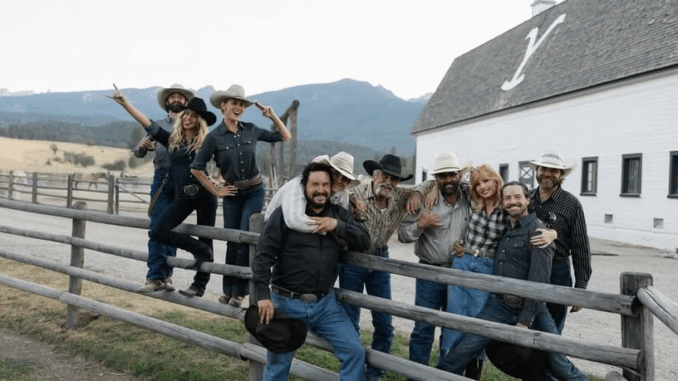
Yellowstone, the acclaimed TV series created by Taylor Sheridan, delves deep into the complexities of land ownership, power, and family dynamics. At the heart of this narrative lies the Dutton family, stewards of the largest contiguous ranch in the United States. Their unwavering commitment to preserving their land serves as both a personal and political battleground, reflecting broader themes of heritage, loyalty, and survival.
The Dutton Legacy: A Tradition of Stewardship
The Dutton family’s connection to their land is more than just ownership; it’s a legacy passed down through generations. John Dutton III, portrayed by Kevin Costner, embodies this legacy. As the patriarch, he views the Yellowstone Ranch not merely as property but as a living testament to his ancestors’ hard work and sacrifice. This deep-rooted sense of responsibility drives his every decision, often placing the ranch’s preservation above personal relationships and moral considerations.
Generational Tensions: The Next in Line
While John Dutton’s dedication to the ranch is unquestionable, his children grapple with their roles in the family legacy. Beth Dutton, his only daughter, is fiercely protective of the ranch but often clashes with her father due to her own ambitions and methods. Kayce Dutton, the youngest son, returns from military service with a desire for peace but finds himself drawn back into the family’s tumultuous world. Jamie Dutton, the adopted son, seeks political power, leading to conflicts with his father’s traditional values. These generational tensions highlight the challenges of maintaining a family legacy in a changing world.
The Battle for Land: External Threats
Beyond internal family dynamics, the Duttons face numerous external threats to their land. Developers, environmentalists, and Native American tribes all have stakes in the Yellowstone Ranch. Chief Thomas Rainwater, leader of the Broken Rock Indian Reservation, seeks to reclaim ancestral lands, viewing the Duttons as modern-day colonizers. This conflict underscores the complex history of land ownership in America and the ongoing struggles of Indigenous communities.
Political Intrigue: John Dutton’s Role
John Dutton’s influence extends beyond the ranch. As the Governor of Montana, he wields significant political power, which he often uses to protect his family’s interests. This dual role places him at the center of political intrigue, forcing him to navigate the murky waters of governance while safeguarding his legacy. His actions raise questions about the intersection of politics, power, and personal interests.
Loyalty and Betrayal: The Dutton Code
At the core of the Dutton family’s ethos is loyalty. The Duttons adhere to a strict code of honor, where loyalty to family and land supersedes all else. This code binds them together but also leads to betrayal. The series portrays how this unwavering loyalty can both strengthen and fracture relationships, as characters make difficult choices in the name of family and legacy.
The Price of Power: Sacrifices Made
The Duttons’ pursuit of power and land comes at a significant cost. Personal relationships are strained, moral lines are blurred, and sacrifices are made. The series doesn’t shy away from depicting the harsh realities of maintaining power, showing that the price of preserving one’s legacy can be steep and unforgiving.
Cultural Reflections: The Modern Western
Yellowstone serves as a modern Western, reflecting contemporary issues through the lens of traditional themes. The series addresses topics such as corporate greed, environmental conservation, and the erosion of traditional values, all set against the backdrop of Montana’s rugged landscapes. This blend of old and new resonates with audiences, offering a fresh take on the Western genre.
The Duttons’ Enduring Influence
Despite the challenges they face, the Duttons’ influence remains unyielding. Their story is a testament to the enduring power of legacy, the complexities of land ownership, and the lengths one will go to protect what is theirs. As the series progresses, the Duttons continue to navigate the intricate dance of power, family, and land, captivating audiences with their compelling narrative.
Conclusion
The Dutton family’s saga in Yellowstone is a compelling exploration of legacy, power, and the complexities of land ownership. Through their struggles and triumphs, viewers are offered a nuanced portrayal of the American West, where tradition and modernity collide, and the past continuously shapes the present. The Duttons’ unwavering commitment to their land serves as both a personal journey and a broader commentary on the challenges of preserving heritage in a rapidly changing world.
FAQs
1. Who are the main members of the Dutton family in Yellowstone?
The primary members include John Dutton III, the patriarch; Beth Dutton, his daughter; Kayce Dutton, his youngest son; and Jamie Dutton, his adopted son.
2. What is the significance of the Yellowstone Ranch?
The ranch symbolizes the Dutton family’s legacy, representing their heritage, power, and connection to the land.
3. How does politics play a role in the series?
John Dutton’s position as Governor of Montana intertwines political decisions with personal interests, affecting the family’s dynamics and the ranch’s future.
4. What themes are explored in Yellowstone?
The series delves into themes such as loyalty, betrayal, land ownership, generational conflict, and the clash between tradition and modernity.
5. Is Yellowstone based on real events?
While the series is fictional, it draws inspiration from real-world issues related to land ownership, Indigenous rights, and the challenges of the American West.
